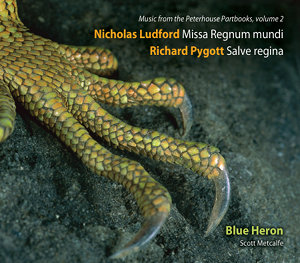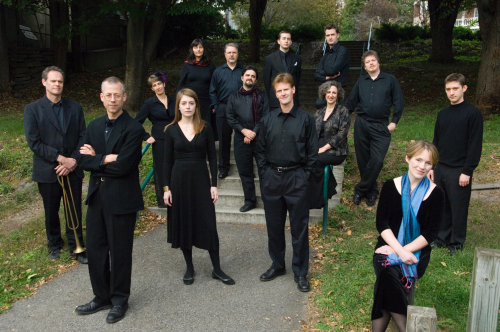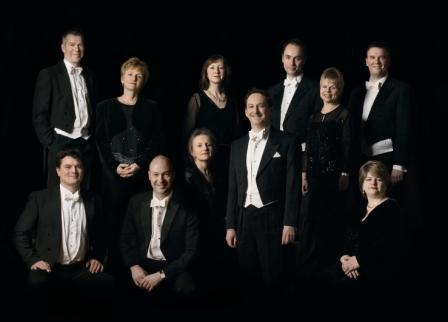Concert Review: An Embarrassment of Vocal Riches — Blue Heron and The Tallis Scholars
It was, for this listener, an embarrassment of riches, even in this early music town. Both groups gave excellent performances of music written at approximately the same time.
By Susan Miron
Two extraordinary concerts took place in Cambridge, MA last weekend, one by Blue Heron at First Church Congregational on Friday, the other by a perennial Boston favorite, The Tallis Scholars, in the cavernous St. Paul’s Church in Harvard Square.
It was, for this listener, an embarrassment of riches, even in this early music town. Both groups gave excellent performances of music written at approximately the same time (for five different monarchs). Both featured pre-concert lectures worth attending, and both groups, approximately the same size (around a dozen singers), have brand new CDs out. Both have brilliant music directors: Scott Metcalfe is founder director of Blue Heron; Peter Phillips founded The Tallis Scholars 39 years ago and has been their music director since then. Both concerts shared many audience members and several critics.
Blue Heron Renaissance Choir is Boston’s own early music vocal group and one to be mighty proud of. I hadn’t heard them until this concert, but I will try not to miss any of their performances in the future. The three women of Blue Heron have dramatic and powerful voices, as does their superb countertenor Martin Near. The Blue Heron’s reputation is as a vocal ensemble of brilliant soloists, who don’t hide their individual voices or personalities. Most have affiliations with other vocal groups (Exsultemus, Emmanuel Music) and some, like the wonderful Pamela Dellal, have become Boston institutions in their own right. (She will be appearing on April 14 in Emmanuel Music’s production of Mozart’s La Clemenza de Tito.)
Their program, “Music for Three Sovereigns,” featured motets for the Holy Roman Emperor Maximilian (1459–1519) and songs for his daughter Marguerite with settings of the last words of Dido, the famously tragic Queen of Carthage, from Virgil’s Aeneid. In his exemplary program notes, Metcalfe points out that Maximilian never got to Rome for a coronation by the Pope; instead, he was crowned in Trent by a papal legate. Maximilian had an obsessive interest in public relations, and it was in Trent that Heinrich Isaac, his court composer, wrote the “Virgo prudentissima,” a motet whose text and music conflate the liturgy and theology of the Assumption of the Virgin “so that Maximilian’s ascent to the Imperial throne and coronation as Emperor might be aligned symbolically with the Virgin Mary’s assumption into heaven and coronation there as Queen.” You can see how closely knit history and music become in this period.
Josquin des Prez (c. 1455–1521) showed up four times on Blue Heron’s program; he is one of the truly great vocal composers of this era. His “Inviolata, integra et casta es, Maria” opened the program, and set the standard for the ravishing vocal textures and expressiveness that followed, through the beautifully performed work “Salve cruz” by Jacob Obrecht (1457/8–1505) through Ludwig Senfl’s (c. 1486–1542/3) “Beati omnes.” The superb tenor Jason McStoots had the lion’s share of solos, which he sang expressively and with beauty.
The tenor line was often doubled by a quiet Renaissance trombone, deftly played by Mack Ramsey, and two sizes of cornetti were played expertly by Michael Collver. Metcalfe, in addition to conducting extremely well, also recited parts of The Aeneid before the corresponding songs based on its texts by Josquin and Johannes Ghiselin and played the vielle (fiddle) with the other two instrumentalists. Their next concert will be “Song of Songs/ Songs of Love” scheduled for June 9 in Cambridge, MA.
The group’s brand new CD is simply gorgeous. It is a continuation of their long-range recording project, Music from the Peterhouse Partbooks, the first volume of which featured the music of Hugh Aston, Robert Jones, and John Mason (2009). This CD is the world-premiere recording of both Nicholas Ludford’s “Missa Regnum mundi” and Richard Pygott’s Salve Regina. If you are a nerdy program book reader (like me), you will love Metcalfe’s notes.They are an education in themselves and are needed, given that many audience members/CD buyers know little about the music from this era and even less about the composers whom he has plucked out of total obscurity. The music is sung two to three on a part and is sublime in every way.
Presented by the Boston Early Music Festival, The Tallis Scholars made their 23rd annual appearance at St. Paul’s Church in Harvard Square. Each time that I’ve been there to hear them the past several years, the cavernous space has been packed. Over 39 years, they have built up a huge fan base (including a huge, loyal Boston following) and deservedly so. Their concerts are impeccably performed, and their voices are perfectly blended, like a well-tuned organ or a well-oiled engine. Under Peter Phillips, who has devoted his career to the research and performance of Renaissance polyphony, The Tallis Scholars have performed 1,700 concerts and made over 60 CDs on their own label, Gimell Records.
Saturday’s concert was inspired by a moment in history—several weeks in June 1520—dubbed The Thread of Gold, the name inspired by a famous encounter between Francois I of France and Henry VIII, a confab arranged to strengthen their friendship after the Anglo-French Treaty of 1514. The over-the-top competition between the two monarchs at the Field of the Cloth of Gold featured tents glittering with silver and gold thread, archery displays, wrestling, feasting, jousting, revelry, a gilded fountain flowing with red wine, and much music. The musicians were led by Jean Mouton of France and William Cornysh (ca. 1465–1523), the younger of two composers with this name.
The rivalry between the two young monarchs (Henry was younger than Francois) was like that of two young bulls. The Field of Gold was, quite simply, set up to show off their magnificence. Nothing was spared. Two ephemeral palaces and chapels were built, and vocal music—the most important part of the revelry and competition—was performed daily.
Two composers faced off, and The Tallis Scholars’ program was devoted to their music. Jean Mouton (ca. 1459–1522), who was represented by five pieces, was for me a real find. His “Nesciens mater,” a Marian antiphon, and “Quaeramus cum pastoribus” exude a calm, pastoral feeling. Mouton’s music dominated the first half of the concert. A neighbor declared one piece to be “a lullaby,” but what heavenly sleepy vibes! Ave Maria was set by both composers and proved a compelling study in contrasts. Mouton’s heart-stopping slow Ave lifted me aloft, while Cornysh’s Ave had a more improvisatory feel, which included an unexpected harmonic daring.
Cornysh was represented by “Ah Robyn,” a three-part canon, which, despite its grim text, was beautiful. Written for the secular enjoyment of Henry VIII and his court, it was one of the evening’s highlights, sung by four sometimes soaring men’s voices. The concert ended with Cornysh’s five-part setting of the “Magnificat,” which is one of the most fascinating and important of the Magnificats found in manuscripts of the period. “Verses of plainchant alternate with polyphony, cleaning the aural palate between each virtuosic onslaught,” the program notes quipped.
The Scholars, as usual, left its audience thrilled. I feel compelled to single out the superb bass Rob McDonald, who added something extra-special to each piece he sang.



